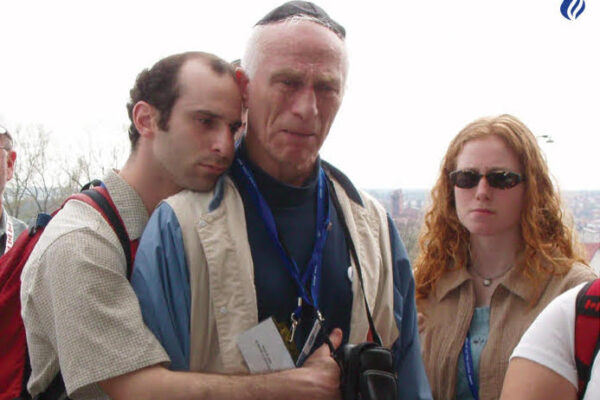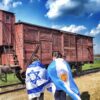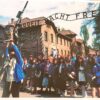When he makes his first trip to Israel this summer, Dustin Fleischer is anticipating “a great cultural journey.” He will be part of an Aug. 10-21 Birthright Israel trip sponsored by the Jewish Federation in the Heart of NJ.
In a June 20 interview with NJ Jewish News, the professional boxer from Monmouth Beach said he expects to have a “spiritual experience” that will further connect him with his heritage as the grandson of a Holocaust survivor whose life and experiences have motivated his boxing career since childhood.
Fleischer said he became interested in traveling to Israel after he attended a recent community Birthright orientation offered by the federation.
He said he was inspired when Lauren Reich, a federation board member, spoke about the federation’s Holocaust Emergency Fund-raising Campaign to restore recently cut services for local survivors (see related story).
To further his own ties with those who suffered through the Holocaust, he said, he will address a June 28 meeting of Café Europa, the local survivors’ support and cultural program conducted by Jewish Family Services of Middlesex County and supported in part by the federation. He will share his grandfather’s story and his mission to fight in honor of the victims and survivors of the Holocaust each time he steps into the ring. “I will tell them: ‘What you guys have gone through has given my life a purpose,” Fleischer said.
His grandfather, Bernard Fleischer, who lived in Monroe Township before he died in 2002, was imprisoned in a concentration camp in Poland, but, his grandson said, “I don’t know which one. My grandfather didn’t talk about it, but his bloodline runs through me. Since he overcame the odds to survive the Holocaust, I know I can beat the odds to become a champion.”
Phil Fleischer, Dustin’s father, shared the story of Bernard’s survival with NJJN in a January 2015 interview.
At 13, Bernard Fleischer saw Nazi soldiers shoot his mother and father to death. Then one of the soldiers took aim and wounded him. “But when he tried to finish my father off, his gun froze, so they left him alone to freeze to death,” said Phil. Bernard “hid under dead bodies until he was caught and placed in a concentration camp.”
Bernard and a friend managed to escape and again hid among corpses. “They spotted some Nazi troops drinking,” said Phil. “They waited until the Nazis were asleep, then they stole their guns and shot them.”
The two men spent the rest of the war fighting in the Resistance. After it ended, Bernard came to the United States and settled in Queens before moving to Monmouth Beach. Bernard’s legacy of struggle and survival made a major impact on his grandson.
“Since I turned pro I have had an opportunity to not only fight for my own dream but to help people who went through that terrible time period,” Dustin said. “My grandfather’s story had a real impact on me. Every time I go into the ring I think about him, and I wear a chai as a reminder that gives me confidence before a fight.”
He began boxing competitively around age 13, and before turning pro in January 2015, his record was 112 wins and 18 losses. “I won three state Golden Glove titles. I was ranked second in the country as a junior boxer and ranked fifth in the country as an open-class fighter. I was also the youngest graduate of the U.S. Olympic Education Center for boxing at the age of 16,” he boasted.
As a professional, Fleischer is undefeated. “My fighting is going very well. In my first year I had a 6-0 record with five knockouts,” he said. “I am looking to have seven or eight fights this year, and after that I will start looking for tougher opponents and then a championship bout.”
Fleischer estimates he will be ready for a shot at the light welterweight title “probably in about a year. With seven or eight more fights, it should put me into world contention.”
In addition to three long workout sessions a day, Fleischer works part-time as a personal trainer, sharing his athletic skills with others. “It is a rewarding experience to help others look better and feel healthier,” he said.
The health of Fleischer and other boxers has been a heightened concern since the late world heavyweight champion Muhammad Ali died at age 74 on June 2. Ali had suffered from Parkinson’s Disease since 1984 — a condition believed to have been caused by many blows to his brain.
“Back when Ali boxed there were not as many heath regulations,” Fleischer said, pointing to the current requirements pro fighters must meet for frequent blood tests, eye exams, brain scans, and electrocardiograms. “I think about getting hurt but chances are a lot more slim now than when Ali was boxing.”
Fleischer considers Ali “in most ways a role model for me. He was an inspirational person. Muhammad Ali wasn’t just a boxer. He was a larger-than-life public figure with a great personality.”
Apart from his strong Jewish identity and his concerns for survivors, Fleischer also dedicates time to two charities. One is the Monmouth County SPCA foster dogs program. “I am a big dog lover,” he said.
He is also determined to contribute to the search for cures for spinal cord injuries, after a friend, Rutgers University varsity football player Eric LeGrand, received a crippling injury during a 2010 game against Army.
“He was paralyzed, but he turned a negative thing to a positive thing,” said the boxer, who is raising money for the Christopher and Dana Reeve Foundation, named after the late movie actor who was paralyzed by a horseback riding accident and his wife.
Fleischer considers himself a religious Jew who attends services at Chabad of the Shore in Long Branch. And although he is willing to fight on Friday nights and Saturdays, he said, he has ruled out going into the ring on the High Holy Days.
Originally published HERE










